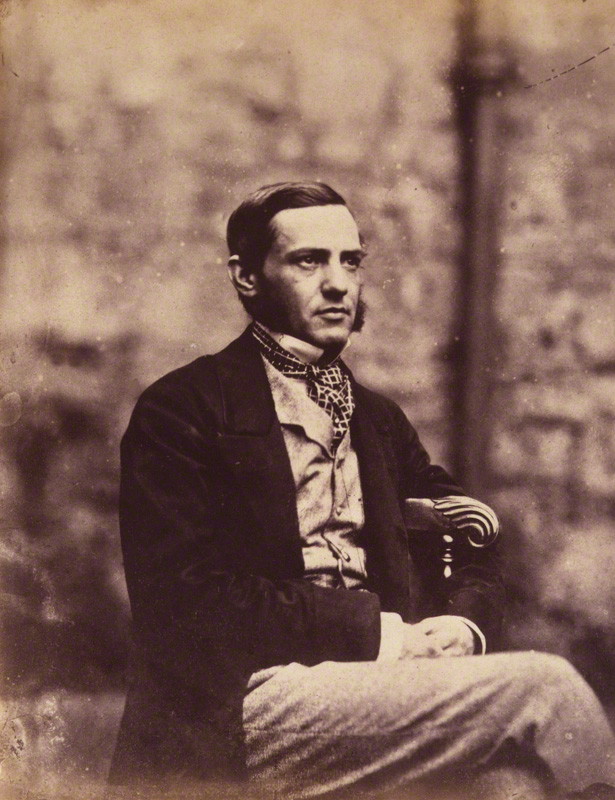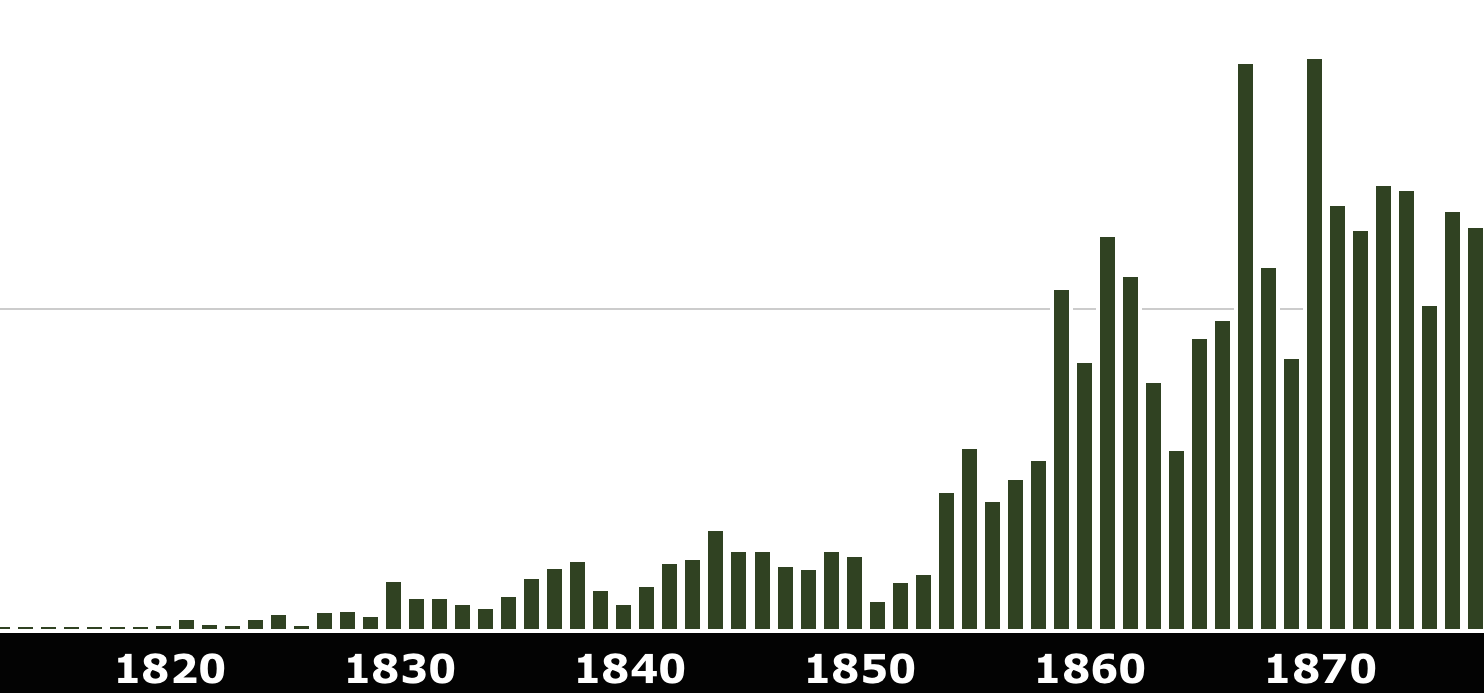The origin of language was investigated in a wide range of disciplines in the nineteenth century. How and why language evolved bore on larger questions about the evolution of the human species, and the relationship between man and animals. Darwin presented his views on the development of human speech from animal sounds in The Descent of Man (1871), but he had been interested in the origin of language since the late 1830s, when he first began to reflect on the transmutation of species. Darwin's correspondence reveals the scope of his thinking about the evolution of language, how his views changed over time, and the array of people-from expert linguists, to naval officers, to bankers-with whom he exchanged information and ideas.
Letter 346: Darwin, C. R. to Darwin, C. S., 27 Feb 1837
Darwin's first letter on the development of language was written to his sister Caroline shortly before he set off on his voyage around the world. He comments on the views of the natural philosopher, John Herschell, regarding the slow development of languages, which casts doubt on the chronology of human history as given in the Bible. "You tell me you do not see what is new in Sir J. Herschell's idea about the chronology of the old Testament being wrong.- I have used the word Chronology in dubious manner, it is not to the days of Creation which he refers, but to the lapse of years since the first man made his wonderful appearance on this world- As far as I know everyone has yet thought that the six thousand odd years has been the right period but Sir J. thinks that a far greater number must have passed since the Chinese, the [space left in copy], the Caucasian languages separated from one stock."
Letter 2070: Wedgwood, Hensleigh to Darwin, C. R., [before 29 Sept 1857]
Darwin's brother-in-law, the etymologist Hensleigh Wedgwood, traced the common origin of apparently dissimilar words (such as the French "évêque" and the English "bishop") and compared the development of language to the process of geological change, involving evolution, extinction, and transitional forms. "I have often thought that there is much resemblance between language & geology in another way. We all consider English a very mixed language because we can trace the elements into Latin, German &c. but I see much the same sort of thing in Latin itself & I believe that if we were but acquainted with the previous state of things we should find all languages made up of the debris of former tongues just as every geological formation is the grinding down of former continents."
Letter 3054: Darwin, C. R. to Lyell, Charles, 2 Feb [1861]
If the descent of languages was seen by some as analogous to the 'descent of man' by natural selection, opponents of evolution might insist that languages, like species, were separately created. Darwin writes to the geologist Charles Lyell about the views of the Harvard naturalist Louis Agassiz and the philosopher Francis Bowen, both of whom asserted the independent origins of "evidently affiliated" languages. "I wish I had time to write you an account of the very absurd lengths to which Bowen & Agassiz-each in their own way-are going. The first denying all heredity (all transmission except specific) whatever. The second coming near to deny that we are genetically descended from our grt-grt-grandfather; & insisting that evidently affiliated languages e.g. Latin Greek Sanscrit owe none of their similarities to a community of origin,-are all autochtonal. Agassiz (foolish man) admits that the derivation of languages & that of Species or forms stand on the same foundation, & that he must allow the latter if he allows the former,-which I tell him is perfectly logical."
Letter 5605: Darwin, C. R. to Müller, J. F. T., 15 Aug [1867]
Darwin asks Fritz Müller, a German naturalist who had emigrated to Brazil, to observe the facial expressions of crying monkeys. Darwin explored parallels between humans and other animals in The Expression of the Emotions in Man and Animals (1872), arguing that similarities in facial movement and gesture showed that human language originated in the instinctual behaviour of animals. "I know very well that I am quite unreasonable in making so many requests & asking so many questions; but there is one point, about which I am very curious & possibly you might obtain information for me.- Some American monkeys cry a little (Rengger & Humbolldt): now when they cry from grief or pain, do they wrinkle up & close their eyes like a Baby always does when screaming & crying? When they cry, especially whilst young, do they scream & make loud noise?"
Letter 7040: Wedgwood, Hensleigh to Darwin, C. R., [1868-70?]
As Darwin began to work on the Descent of Man, he corresponded further with his cousin, Hensleigh Wedgwood, about the conditions required for the formation of human language. Wedgwood argued against the commonly held view that language required a high level of civilization and that it developed as a result of conscious design. "Perhaps the best answer to this assertion would be to point out that language was never formed designedly…. Every change would be an instinctive, not a meditated operation and therefore there is no reason why it should not have been carried to any extent by those who had no thought of their modes of expression at all Practically we see that people in the rudest stage do understand these complex modes of speech. Therefore as it appears to me there can be nothing in the uncivilised condition of life that could have hindered speech from gradually growing to such a stage"
Letter 8367: Darwin, C. R. to Wright, Chauncey, 3 June [1872]
In this letter to the American philosopher and mathematician, Chauncey Wright, Darwin discusses William Dwight Whitney's theory that language evolves through the will of man. Darwin suggests that language change is a result of "unconscious selection", the same process he had described in Origin of Species as governing the production of new breeds of domestic animals. "I have been … reading an article by your Prof. Whitney …. He argues because each step of change in language is made by the will of man, the whole language so changes; but I do not think that this is so, as man has no intention or wish to change the language. It is a parallel case with what I have called "unconscious selection" which depends on man consciously preserving the best individuals & thus unconsciously altering the breed.
Letter 8962: Darwin, C. R. to Max Müller, Friedrich, 3 July 1873
In the 1870s, Darwin corresponded with the German philologist and Oxford professor Friedrich Max Müller, who opposed Darwin's theory of evolution and its extension to language. Darwin presents himself modestly and tries to avoid adversity despite their disagreements. "As far as language is concerned I am not worthy to be your adversary…. I should have been glad to have avoided the whole subject, but was compelled to take it up as well as I could. He who is fully convinced, as I am, that man is descended from some lower animal, is almost forced to believe a priori that articulate language has been developed from inarticulate cries; and he is therefore hardly a fair judge of the arguments opposed to this belief[.]"
Letter 10194: Max Müller, Friedrich to Darwin, C. R., 13 Oct [1875]
For Müller, human and animal language were profoundly different, not only in degree, but in kind. Science, he claimed, had yet to find any evidence to bridge this divide, and so the question of the origin of language remained unanswered. "In the higher animals the potential traces of language are smaller than in some of the lower, but even where the phonetic organs are most perfect, there has never been the slightest attempt at language in the true sense of the word. Why should natural science be unwilling to admit this- why should it not at all events leave the question an open question until some truly scientific evidence has been brought forward showing at least the potentiality of language in any known animal. "More facts & fewer theories" is what we want, at least in the Science of Language […]"
Letter 9887: Dawkins, W. B. to Darwin, C. R., 14 Mar 1875
The relationship between language and race was a widely debated and controversial subject in Victorian anthropology. William Boyd Dawkins, professor of geology at Owens College, Manchester, and the author of a book on early humans (Cave Dwellers) remarks on recent discussions about whether the Basque language (the only non-Indo-European language on the European continent) is a mark of racial distinction. "The philologers … have been laying down the law that language is a test of race, and have assumed that, as I did not take up its evidence on the Basque question, language had been altogether ignored in the enquiry. On the question being put to Prince Lucien Buonaparte, Sayce, Rhys, and Van Eys the other evening, "whether they considered that the Ethiopian could change his skin and whole physique as easily as his speech?", the answer was obviously "no". So that as the case stands at present three distinguished philologers hold that language is not a test of race […]"
Letter 11074: Sayce, A. H. to Darwin, C. R., 27 July 1877
Darwin's study of human nature had involved extensive observations of his own children as they developed from infancy. The Orientalist and comparative philologist Archibald Sayce wrote to Darwin with a series of detailed questions about language acquisition, including how a child first uttered the word 'mum'. In his reply, Darwin told Sayce "that 'mum' arose from opening & shutting the mouth repeatedly as a sign of wanting to eat, for this movement makes a sound like the letter m." "For some time past I have been collecting facts relative to the first attempts of children at speaking, & after making the allowance for inherited capacities & the existence of a fully-formed language round the child it seems to me that these facts will throw much light on the origin of language. (1) Were you able to trace the sound of mum from an inarticulate into an articulate stage of pronunciation?




